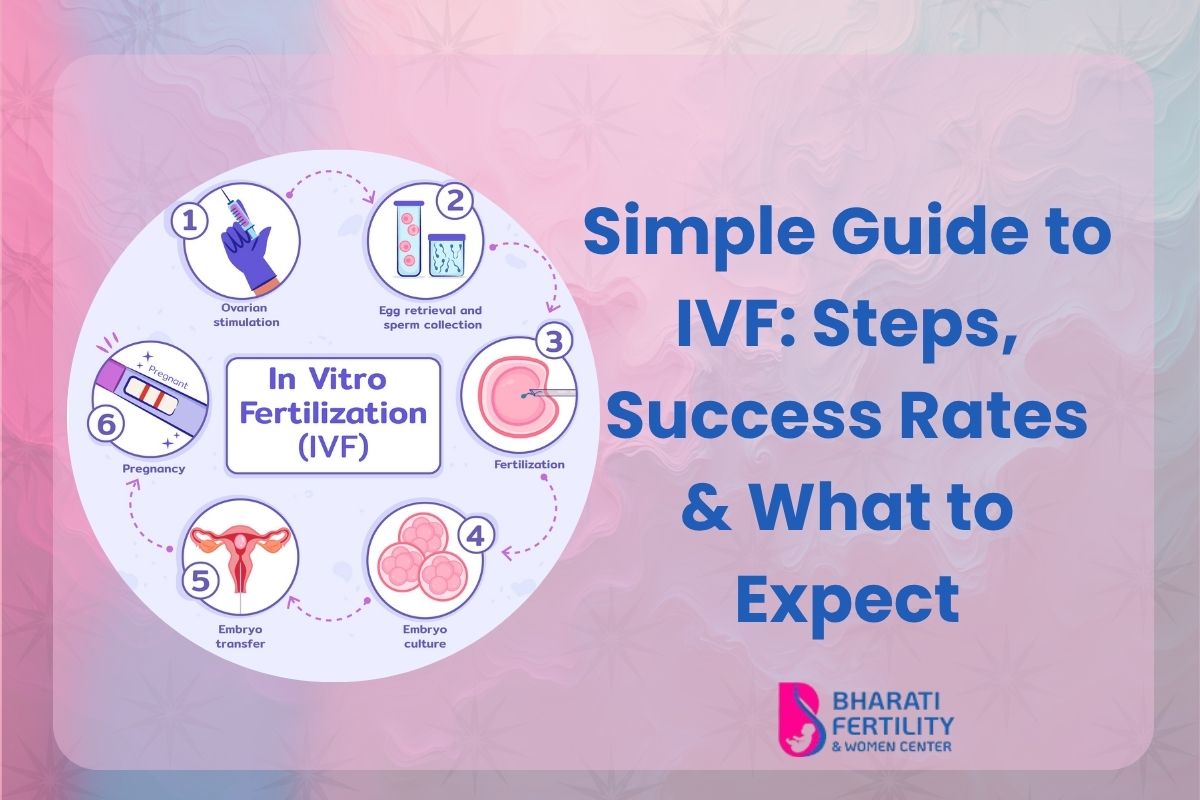Best Gynecologist in Mylapore, Chennai
When to Receive an Infertility Diagnosis: Age, Lifestyle, and Suggestions for Early Evaluation

Simple Guide to IVF: Steps, Success Rates & What to Expect
This guide clearly explains the IVF process, covering the steps involved and the things that impact your IVF success rate. This information will help you make good choices about your treatment. We cover the step-by-step procedure, what results are realistic, local details (like IVF in Chennai), and when you should consult a fertility specialist to plan your best treatment path.
IVF: The Science and Simple Steps
IVF (In-Vitro Fertilization) is a process where an egg is fertilized by sperm outside the body in a lab. A full cycle takes about 2–3 weeks, followed by a 10–14 day wait for a pregnancy test.
Modern IVF Technology
New lab techniques have greatly improved success:
- ICSI:Injecting the sperm directly into the egg.
- Blastocyst Culture:Growing embryos for 5 days instead of 3.
- Vitrification:A quick-freezing method for eggs and embryos.
- PGT-A:Genetic testing of the embryo before transfer.
The IVF success rate (live birth per fresh transfer) is around 40%–50% for women under 35, but drops to 15%–20% for ages 38–40. Thanks to good freezing methods, the total chance of having a baby (across fresh and frozen cycles) can be 50%–70% for women under 35.
Getting Ready for IVF
Before starting injections, you will have basic tests:
- AMH(A hormone that shows how many eggs you have left).
- FSH(A hormone test done early in your period).
- AFC(A count of tiny sacs in your ovaries done by ultrasound).
- Semen analysisfor the male partner.
- Infectious disease screening.
Tips to boost your chances: Aim for a healthy weight (BMI), stop smoking, and start taking folic acid.
The IVF Cycle: Step-by-Step
This table shows exactly what happens in an IVF cycle and how long each part takes:
|
Phase |
Time |
What is Done |
Monitoring |
|
1. Stimulation |
8–14 days |
Daily hormone shots to grow many eggs. |
Ultrasounds and blood tests (every 2–3 days). |
|
2. Retrieval |
Single day |
A "trigger shot" is given, then eggs are collected under light sleep. |
Day 0: Eggs are mixed with sperm (IVF or ICSI). |
|
3. Lab Culture |
3 or 5 days |
Embryos grow in the lab; they are checked and graded. |
Selection of the best embryo (often at Day 5—Blastocyst). |
|
4. Transfer |
Single day |
Embryo is placed into the uterus. Often only one embryo is transferred (eSET). |
You start taking progesterone medication for support. |
|
5. Testing |
9–14 days later |
Blood test (Beta-hCG) to check for pregnancy. |
Ultrasound follow-up at 5–6 weeks if pregnant. |
Export to Sheets
Success Rates and Other Important Factors
Success Rates by Age
The IVF success rate is mostly determined by the age of the woman's eggs:
- Under 35:About 40%–50% chance of live birth per cycle.
- Ages 35–37:About 30%–40%
- Ages 38–40:About 15%–25%
- Over 40:About 5%–10%
Using Donor Eggs: Success is often over 50%, regardless of the recipient's age. When looking at IVF in Chennai, ask the clinic for their published rates by age group.
Emotional and Money Matters
- Emotional Stress:It's normal to feel very anxious, especially during the 2-week wait. Get counseling, join a support group, and include your partner in every step.
- Cost:The basic IVF cost in India is often INR 80,000 to 2,50,000 per cycle, plus medications (another INR 20,000–80,000). Ask for a clear price list before starting. Remember, most patients need more than one cycle (average 1.5–3 attempts).
Risks to Know About
- OHSS (Ovarian Hyperstimulation Syndrome):The ovaries swell and leak fluid. Severe cases are rare (about 1%–2%). Doctors manage this risk by changing medicine doses and sometimes freezing all embryos for later transfer (freeze-all).
- Twins/Multiples:This risk is high if multiple embryos are transferred. Most doctors now recommend transferring only one embryo (eSET) to keep the twin rate under 2%.
- Ectopic Pregnancy:The pregnancy starts outside the uterus (2%–5% risk).
Always Consult an IVF specialist about their specific plans for managing these risks.
After the Procedure
Follow-Up Care
After the embryo transfer, you will keep taking progesterone until the pregnancy test (Day 9–14). If the test is positive, you'll have an ultrasound at 5–6 weeks to check the baby's heartbeat.
If IVF Fails
If the first attempt doesn't work, don't give up. The doctor can discuss:
- Using any frozen embryos (FET).
- Repeating a fresh cycle with different medications.
- Adding advanced tests like PGT-A.
The total chance of having a baby often goes up to 60%–80% after three cycles for women under 35. You should consult an IVF specialist to review your old cycle data and plan the next steps.
To summarize, know the IVF process, understand the realistic IVF success rate, and choose a specialist who will customize the treatment for you, whether you choose IVF in Chennai or anywhere else.


